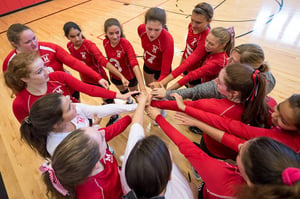The teenage years are marked by paradoxes. Even as teens’ cognitive and problem-solving capacities are expanding, many adolescents experience declines in academic performance, coupled with an increase in behavioral and mental health concerns. Research shows that parental involvement helps stave off these negative trends — but it also reveals that parents’ school-related involvement drops during these years as teens seek greater independence. To add to the challenge, parents may find that strategies that worked in elementary school are no longer effective.
Into this mix comes a recent study of middle and high school students that highlights ways that parents can effectively adapt their involvement to meet the changing needs of adolescents. Teens and parents are on a “paired journey,” marked by shifting family dynamics. The key for parents? Engage teens in a way that honors their autonomy while also providing structure and support.
“The good news is that youth still want their parents to be involved,” says Harvard University Professor Nancy Hill, one of the study’s co-authors.
“This involvement doesn’t have to be a power struggle. Parents need not be afraid to allow teens to try and succeed or try, fail and try again. Parents are in the single-best position to cultivate, encourage and affirm their teen’s development.”
Hill and her colleagues identified specific types of parental involvement that were associated with increased grade-point averages, decreased behavioral concerns and reduced depressive symptoms.
Scaffold Independence
Scaffolding, says Hill, “means letting teens try out things independently, with a ‘safety net.’ ” This includes giving them opportunities to try — and fail at — new endeavors, waiting for them to ask for help before rushing in to provide it, and talking through choices and potential outcomes and then allowing them to make their own informed decisions. Parents of younger adolescents can start this process by letting them choose between options that the parent thinks are equally good, and then increasing autonomy from there.

Of course, there will still be times when parents need to step in and provide extra support, but they should examine their motivation for doing so. “When parents jump in and micromanage homework because they are frustrated, it is probably not helpful and may be counterproductive,” Hill says. “If they are helping because the teen asks for it or agrees they need help, then it can be highly effective.”
Provide Structure at Home
Parents can support academic achievement by providing time, space and materials for teens to manage their own schoolwork. This also includes establishing family expectations regarding homework and leisure activities and providing academically enriching family activities.
However, this structure should also honor teens’ growing autonomy. For example, Hill cautions against over-involvement in homework, even when students are struggling.
“It is not easy to watch — or let — your son or daughter fail to complete assignments or not earn grades that you know they are fully capable of earning,” says Hill. “If you can stomach it, let them wait until the last minute to do the big assignment and don’t jump in and rescue them until they ask. Yes, it is hard. But, in the process, they might learn the bigger lessons about the consequences of their actions and how to recognize when they need help.”
Link Education to Future Success
Multiple studies have observed that a parent’s expectation that his or her child will  attend college is associated to academic achievement. Parents can help teens connect the dots between their current academic efforts and their future success. This requires ongoing conversation about their career goals and about how teens’ current schoolwork is relevant to these aspirations. Parents who engage in this dialogue help children find meaning in their academic efforts, which is a key ingredient to internal motivation.
attend college is associated to academic achievement. Parents can help teens connect the dots between their current academic efforts and their future success. This requires ongoing conversation about their career goals and about how teens’ current schoolwork is relevant to these aspirations. Parents who engage in this dialogue help children find meaning in their academic efforts, which is a key ingredient to internal motivation.
Demonstrate Warmth
Perhaps it’s no surprise that teens benefit from a supportive parent-child relationship that balances emotional closeness, structure and autonomy. But according to the Harvard study, parental warmth has an amplifying effect on each of the other strategies. When parents demonstrate warmth and love, they provide a safe base from which students can “tackle the academic and psychological challenges of secondary school.”
And here’s one more silver lining for parents: These strategies remain effective even when teens distance themselves from parents.
When teens push themselves away, says Hill, “it does not mean that they don’t want and crave their parents’ acceptance of their identities and interests. One of my colleagues said parenting teens is like hugging a cactus. Even as the ‘warm fuzzies’ are not often reciprocated, teens still need them, still need to know they are loved unconditionally. Don’t miss the opportunity to say or show love, warmth and affection toward even your most prickly teen.”
Originally published in MindShift on June 23, 2015.





